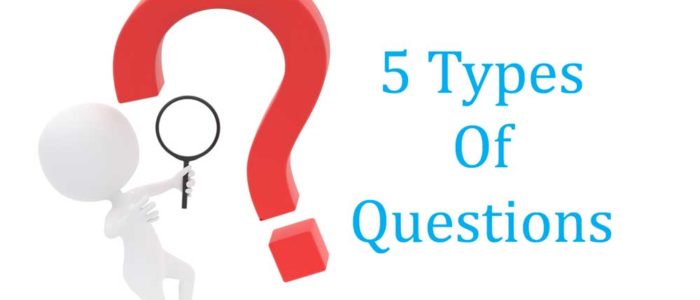5 Types of Questions
Have you ever had someone tell you what to do? How did you react? Did it depend on whether or not you were ready to hear it?
What helps you to change more? Being told what to do or coming to your own conclusion? When I’m told what to do, sometimes I listen and sometimes I don’t. It depends on how much I accept the other person’s conclusion.
When someone asks me questions and helps me to think something through, I can then come to my own conclusion.
When mentoring, the trick is to help someone come to a conclusion that you know is a healthy response.
I have learned that questions lead to behavioral change.
Knowing types of questions has helped me to be more aware of questions to ask and when to ask them.
Below are 5 different types of questions to create change.
Type 1: Generic Questions
These are questions that are fairly broad and can be used in a number of situations.
“What would you like to get out of this?”
“What does that look like to you?”
“John, can you use empathic communication and reflect back what you just heard your wife say?”
“Thanks John. Jill what do you think?”
We provide a number of generic questions in our training material.
Type 2: Open-Ended Questions
Open ended questions can’t be answered with a “yes” or “no.” They allow people to answer in any way they want. They cause the mentee to talk more.
Here are examples of questions:
- What / How – Questions that start with how or what tend to be more open in nature.
- Why – Why questions are tricky. They depend on the inflection in your voice. If I use an accusatory tone it can cause someone to become defensive. Said in a non-threatening way they come across as curious.
- Where / When / Who – These questions elicit specific information. They may be needed to understand a situation.
- Do / Did – These are closed-ended questions. They can be a great way to get an answer and can be followed up with an open-ended question. “Did you enjoy the church service?” “What did you enjoy?”
- I wonder / You must / I’d like to hear – Indirect questions that can help someone to explore thoughts, feelings or behaviors.
Type 3: Revealing Questions
Revealing questions bring something to the couple’s awareness. They may not have realized that this is an issue. This includes observations questions which are based on what you have seen or heard.
“When your spouse comes home, it seems like you get angry. Is that happening?”
“If you woke up tomorrow and your marriage was perfect, what would it look like?”
“I’ve noticed that when you come home late, your spouse feels rejected. Have I described that correctly?”
“What is your spouse’s point-of-view?”
“When we bring up this topic, you appear to shut down. Is that right?”
“Last time we spoke your spouse told you that she really valued quality time, but today you told me you are too busy for her. It that right?”
Type 4: Consequence Questions
Consequence questions are one of the most important types. They focus on the impact to yourself or to the relationship if you continue with a behavior or a thought. They can help someone to decide to change.
“What happens if you continue in this way?”
“What would be the disadvantage if you continue to defend yourself?”
“If you were to validate your spouse, how would they feel?”
“Will that result in more or less connection?”
“Would that build your bond or tear your bond down?”
I’ll go into these types of questions in more detail in another post.
Type 5: Directive Questions
Directive questions are sometimes a blunt assertion that they have to change something. Sometimes, they are confrontational. They don’t have to be. These questions imply action, but come at a cost. The cost is to the relational capital. They are more effective once you have built up a good relationship.
“You don’t agree on this. What are you going to do when it comes up?”
“When are you going to stop texting with your former girlfriend?”
“When are you going to stop putting each other down?”
“What’s more important? Winning the argument or keeping your marriage?”
When you are facilitating a group or meeting with a couple and you aren’t sure what questions to ask, think about this list. I know that it helps me to think through different types of questions that I can ask. As a marriage mentor or a marriage educator, it helps to ask great questions!
Do you have other questions that you have found to be effective?





Comments are closed.